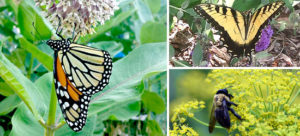
Elmhurst College has won recognition from the National Wildlife Federation and the Illinois Food Scrap Coalition for two aspects of its sustainability efforts.
The National Wildlife Federation recently designated the College’s gardens as a Certified Wildlife Habitat, a designation reserved for gardens that help wildlife thrive by providing ample food, water, cover and a place to raise their young.
The College’s gardens, specifically the newly dedicated Monarch Butterfly Waystation, are specially designed to support pollinators and other wildlife. The College has a prairie garden boasting more than 500 native species of plants, with a profusion of milkweed in the butterfly garden. In addition, the College has reduced chemical pesticide use across campus as a means to ensure further survival of critical wildlife populations.
Also this fall, the College received a Gold Partner designation in We Compost, a program run by the Illinois Food Scrap Coalition. The Gold Partner designation recognizes businesses and institutions that demonstrate the highest level of commitment to food scrap diversion.
A regional leader in the food scrap composting effort since mid-2012, Elmhurst has generated more than 21,000 pounds of food scrap compost in this academic year so far—keeping more than 10 tons of waste out of landfills.
When Elmhurst launched its food composting program in 2012, it focused solely on food scraps from the kitchen’s meal preparation area. But with the installation of a grinder in the Frick Center basement in early 2014, the program expanded to include material from the cafeteria itself, including compostable tableware.
Students involved in the College’s Living Green Team support the composting effort by helping students and staff sort trash in the cafeteria.